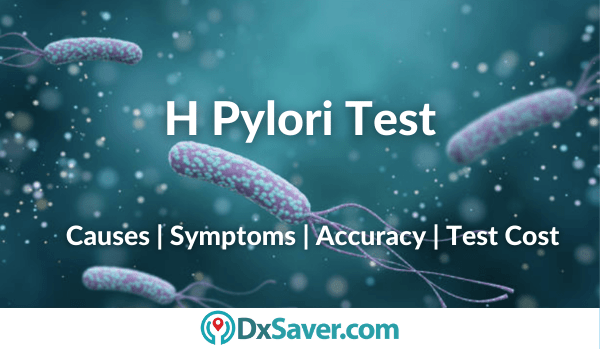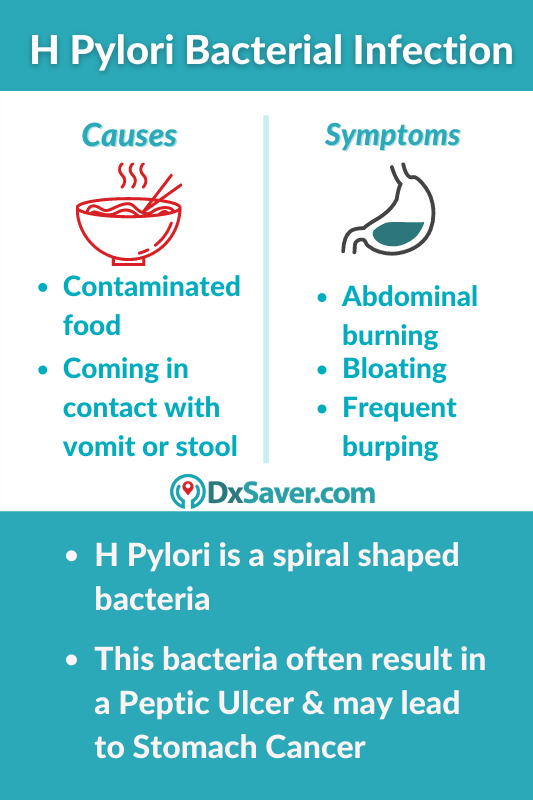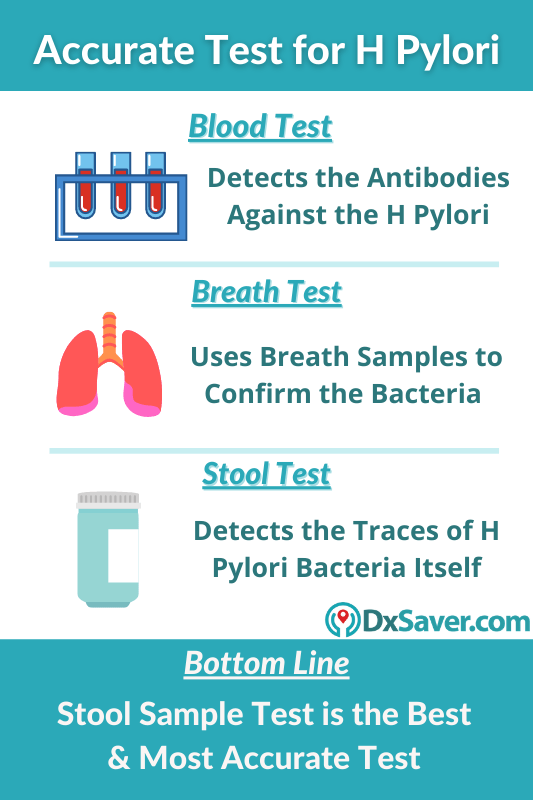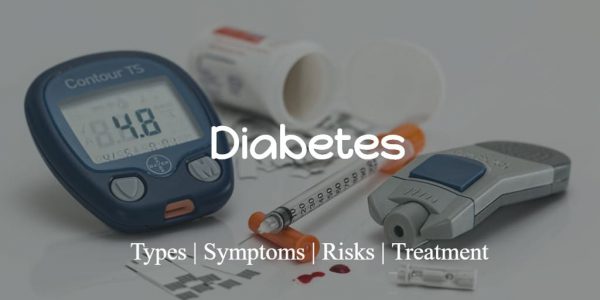
H Pylori or Helicobacter Pylori is a bacterial infection that causes ulcers and gastrointestinal problems in individuals. This infection is a super common issue. According to a survey conducted by PubMed, there are nearly 4.4 Billion individuals affected with H Pylori infection worldwide.
This bacteria has the ability to adapt to the environment inside the intestine by changing/reducing the acidity. This can lead to severe stomach problems, ulcers, or even cancer, in rare cases. So, we highly recommend if you experience any of the symptoms, to get tested for H Pylori Infection
- H Pylori Test Cost
- What is the H Pylori Test?
- Why is an H Pylori Test done?
- H Pylori Symptoms
- Is there any Preparation Required Before the Test?
- How is the H Pylori Test Done?
- Best & Accurate H Pylori Test
- How Long Does H Pylori Test Take?
- H Pylori Test Normal Range
- H Pylori Test Positive Treatment
- Providers Locations
For our readers, who are very much interested in knowing the H Pylori test cost beforehand, we would like to begin with that section.
H Pylori Blood Test Cost
H Pylori test costs about $48 in the U.S. No prior appointment is required. Compare the price, order your test online and visit the nearest lab during lab business hours. Complete the procedure and get the results in your email in 2 to 3 business days.
The following table shows the H Pylori Blood test cost at one of our partner laboratories (CLIA – Certified) network located across the U.S.
Name of our Partner Labs | Book Online |
HealthLabs
| Offer Price$48 |
H Pylori Breath Test Cost (Urea Breath Test / Stool Sample Test)
Non-blood H Pylori test costs about $428 in the U.S. No prior appointment is required. Compare the price, order your test online and visit the nearest lab during lab business hours. Complete the procedure and get the results in your email in 2 to 3 business days.
The following table shows the cost of the H Pylori breath test & H Pylori stool sample at one of our partner laboratories (CLIA – Certified) network located across the U.S.
Name of our Partner Labs | Book Online |
Personal Testing Lab
| Offer Price$428 |
H Pylori test cost with insurance
Most of the health insurance policies in the U.S. cover the cost of the H Pylori blood test. However, the coverage offered by private health insurance companies and national health insurance programs like Medicare and Medicaid might vary. So we recommend you to check the coverage of your health insurance plan before getting tested for Celiac disease.
Our H Pylori testing providers do not accept any kind of health insurance plan. But, if the insurance company accepts to reimburse the cost, they can provide you with an itemized receipt containing all the details like the name and code of the test, and the CPT code that is necessary for insurance reimbursement purposes.
What is the H Pylori Test?
Helicobacter Pylori which is commonly known as ‘H Pylori’, is a type of spiral-shaped bacterium that causes infection in the stomach. H Pylori bacterium is one of the prime reasons for people having peptic ulcers, and it can also cause gastritis and has the potential to lead to stomach cancer.
As per the latest reports, about 30 – 40 percent of people in the United States get affected by H. pylori infection at least once in their lifetime. Not only grown adults get infected but also children are vulnerable to this bacterium. This infection does not cause symptoms unless it gets severe.
H pylori bacterium scrapes the inner protective coating in the stomachs and causes inflammation. In rare cases, this can lead to peptic ulcer, gastritis, or stomach cancer.
H pylori infection maintains a low profile and doesn’t show any noticeable or sickness signs at the early stages. There is no vaccine to prevent oneself from it. However, H Pylori infection can be treated with antibiotics. If you experience symptoms like abdominal pain, frequent burping, your physician might ask you to get tested for H Pylori.
H Pylori Causes
For many years, experts thought people encountered ulcers due to spicy food intake, smoking, stress & other lifestyle habits. But, the concept was taken a wider view after the discovery of Helicobacter Pylori in the year 1982. It was then concluded it was the primary reason for major stomach ulcers.
Doctors believe the bacteria has been living for decades with the human anatomy. It is also said that the germs can be contracted from person to person by mouth, such as by kissing or salivary contact.
Causes of H Pylori include –
- Eating contaminated food, or from unclean utensils
- Consuming impure/unfiltered water
- Contact with the saliva or other body fluids from an infected person
- Transferrable by having contact with vomit or stool

Why is an H Pylori Test done?
Once the H Pylori invades the body, the bacteria starts deteriorating the inline of your stomach, which helps in guarding the stomach wall against food-digestive acids. Over the long run, the inline of the stomach will be damaged enough to let the acid to get in touch with the stomach lining, which ultimately causes ulcers. Most of the time, people with H Pylori infection do not experience any unusual symptoms. We still don’t have an exact reason why this is, but doctors believe some people may be born with more resistance against H Pylori infection.
This test is done to formulate the diagnosis and treatment for Helicobacter pylori (H. pylori) bacteria infections, and/or to determine the cause of chronic type B gastritis.
The H Pylori Test is an IgG antibody test. It looks for antibodies (protein substances secreted against foreign pathogens in the blood) that develop as a consequence of H Pylori presence. As a result, they help in indicating that there is an active H Pylori infection or that there was an H Pylori infection in the past 12-18 months.
H Pylori Symptoms
This bacteria often result in a peptic ulcer causes which is identified by a dull or burning pain in your stomach, this can be easily seen while the stomach is empty. It can last for a few minutes or hours until the next meal, it recurs again after a few hours of the meal is taken. It may come and go for several days or even weeks.
If you have these symptoms and the following signs, your physician will ask to get tested for H Pylori. There are 3 types of tests available in which you can take any one or go according to your doctor’s prescription to check this infection – blood, breath, and stool tests.
People who have encountered symptoms with H Pylori infection reported the following signs:
- An ache or burning sensation in your abdomen
- Abdominal burning while the stomach is empty
- Nausea
- Loss of appetite
- Frequent burping
- Bloating
- Sudden weight loss
Following are considered severe symptoms of H Pylori Infection
- Severe and persistent abdominal ache
- Difficulty in swallowing
- Bloody or black tarry stools
- Black vomit or vomit that looks like coffee ground
H Pylori Transmission
Most pathogens and bacteria, including H Pylori, can evolve from dirty and unclean places. H Pylori bacteria can transmit via contaminated food or water. It can also be passed from one person to another through direct contact with saliva, vomit, or fecal matter from an infected person.
This infection is often acquired in childhood. The most common factors for getting this disease at a young age are as follows –
- Underdeveloped/Developing country. People living in developing countries, where crowded and unsanitary living conditions may be more common, have a higher risk of H Pylori infection.
- Lack of supply of clean water. Having a reliable supply of clean, running water helps reduce the risk of H Pylori.
- Living with someone who has an H Pylori infection. If someone you live with has H Pylori infection, you’re more likely to also have this infection.
- Living in crowded conditions. You have a greater risk of H Pylori infection if you live in a home with many other people.
Is there any Preparation Required Before the Test?
For the blood test, there are no special preparations like fasting or diet control needed. You can continue with your regular activities and food intake.
As far as the stool sample test is concerned, you will be required to stop medications such as antibiotics and proton pump inhibitors (PPIs) before the test, if you are taking any. As it may influence the final result of the test. Other than this there are no other pre-requisites for the H Pylori stool test.
If you are opting to take the breath test, you’ll be asked to swallow a preparation liquid that contains urea during the test. At least one hour of fasting is necessary before taking the H Pylori breath test. Avoid consuming antimicrobials, proton pump inhibitors, or bismuth preparations for 2 weeks prior to the test.
How is the H Pylori Test Done?
H Pylori Blood Test
An H Pylori blood test is a simple test done using the blood sample. During this test, the phlebotomist will put a tight elastic band around the upper arm to make the vein visible and swell with blood. The area to be injected will be cleansed with an antiseptic liquid. Then, he/she will inject the needle into the vein to draw some blood. After removing the needle, he/she will ask you to apply some pressure on the injected area with a cotton ball to stop bleeding. The blood sample collected in a test tube is sent to the lab for further analysis.
It takes less than 10 minutes to perform this test.
H Pylori Urea-Breath Test (UBT)
H Pylori breath test analyzes the breath samples. During the test, you will be asked to breathe in and out into a special bag. Then, you’ll be given a special liquid drink that has a substance called urea. After a wait time of 15 minutes, you’ll breathe into a second bag. Then both the bags are sent to the lab for testing.
Generally, the bacteria will convert the urea in your body into carbon dioxide, and lab tests will show that your breath has higher than normal levels of the gas. This helps in conclude the cause of inflammation and ulcers in the stomach, as there is an active H Pylori infection.
H Pylori stool sample test
For the stool sample test, you will be given a container to take home with you to catch and store a sample of your stool. Once you return the container, the laboratory will begin the analysis to detect the presence of the H Pylori bacterium.

Best & Accurate H Pylori Test
The blood test detects the H Pylori antigen in the blood. Breath test uses the two different breath samples and concludes whether the stomach has developed an active H Pylori infection. The stool sample test takes the patient’s stool specimen for analyzing the actual presence or traces of the H Pylori bacteria. According to a study, a stool sample test is the most reliable & error-free for H Pylori infection.
Thus comparing the 3 types of test – Blood Test, Breath Test, and Stool Test, the stool antigen test is the best and most accurate test for H Pylori infection.
How Long Does H Pylori Test Take?
The testing process for this test is quite fast. After the sample has been derived from the patient, H Pylori Test takes 1 – 3 business days for the results to arrive.
H Pylori Test Normal Range
Negative H Pylori Test
If your H Pylori test report falls ≤ 30 U/mL, then it depicts that there is no active H Pylori infection.
Positive H Pylori Test
If your test result is positive, over ≥ 40 U/mL Positive, and stats that you have an active H pylori infection but you do not experience any problems then you aren’t at increased risk of stomach cancer, treatment may not offer any benefits. However, it is advisable to be cautious in food habits to prevent the infection from getting severe.
In the case of severe symptoms, you will be asked to follow certain food habits and avoid some foods for the betterment of the stomach. Your physician may also prescribe you medications and antibiotics to help cure the damage caused by the H Pylori bacteria.
Treatment for H Pylori Test: Positive
Ulcers caused by H Pylori can be cured with a natural diet, medications, or triple therapy. Diagnosing the infection at an early stage may reduce your risk of developing stomach cancer.
Natural Treatment & Diet for H Pylori
H Pylori infection can be easily treated by adjusting your food course. Following are some foods to include in your diet for suppressing the peptic ulcer pain and to help recover the damaged stomach wall;
Foods for H Pylori
- Cranberries
- Broccoli and Cabbage
- Fish (and other omega-3 rich foods)
- Green Tea
- Ginger
- Honey
- Vitamin C rich Fruits
- Turmeric
Foods to Avoid for H Pylori
- Spicy foods
- Alcohol
- Smoking
Triple Therapy for H Pylori: Medications
If your infection has gone overboard to get back under control with a natural diet, your physician will prescribe a triple therapy, which involves antibiotics and medications.
“Triple therapy” treatment refers to the diagnosis of a combination of two different antibiotics, together with another drug that reduces your stomach acid. This therapy ultimately heals the stomach inline damage and lowers stomach acid.
Medications used in triple therapy include:
- Proton-pump inhibitors (PPI), such as lansoprazole (Prevacid), esomeprazole (Nexium), or rabeprazole (AcipHex)
- Metronidazole (for 7 to 14 days)
- Amoxicillin (for 7 to 14 days)
- Clarithromycin
The combination of drugs used for your triple therapy treatment may vary depending on your past medical history and allergies.
What Happens if H Pylori Infection is Left Untreated?
If you experience any of the symptoms related to H Pylori, it is highly advisable to get tested for this infection and start the treatment. Ignoring the symptoms can lead to severe health complications like –
• Ulcers
The very first damage of the long term H Pylori bacteria is an ulcer. This infection starts scraping the protective lining of your stomach and small intestine. As a consequence, the digestive acid can come in contact with the stomach lining, causing uncomfortable pain, which is often termed as an ulcer. The pain is more intense when the stomach is empty.
• Internal Bleeding
In some cases, internal bleeding can occur as the peptic ulcer can break through your blood vessel, as a result, you’ll see bloody or black-colored stool.
• Inflammation of the Stomach Lining
H Pylori infection can result in inflammation (gastritis). Also, they can lead to a hole or perforation in your stomach wall.
• Stomach Cancer
Studies show that this infection is a strong risk factor for certain types of stomach cancer.
H Pylori Preventive Measures
This is caused by bacteria. Most bacteria and other microorganisms evolve from an unclean environment. Therefore you can prevent yourself from H Pylori by keeping your surroundings clean and sanitized. There is no vaccine for H pylori. However, there are antibiotics that help in curing the infection. It is always said, prevention is better than cure. Keep in check the following habits to guard yourself against harmful bacteria –
- Eat properly prepared food
- Drink water from a clean, safe source
- Wash your hands after using the bathroom and before eating
Providers Locations
H Pylori test can be done in any of the following locations across the U.S. by visiting the nearest lab. To know the H Pylori test cost, refer to the first section of the article.
- Alabama
- Arizona
- Arkansas
- California
- Colorado
- Connecticut
- Delaware
- Florida
- Hawaii
- Georgia
- Idaho
- Illinois
- Indiana
- Iowa
- Kansas
- Kentucky
- Louisiana
- Maine
- Michigan
- Minnesota
- Mississippi
- Missouri
- Montana
- Nebraska
- Nevada
- New Hampshire
- New Mexico
- North Carolina
- North Dakota
- Oklahoma
- Oregon
- Pennsylvania
- Puerto Rico
- South Carolina
- South Dakota
- Tennessee
- Texas
- Utah
- Vermont
- Virginia
- Washington
- West Virginia
- Wisconsin
- Wyoming
Frequently Asked Questions
Will insurance cover my testing cost?
No, insurance will not be covered in the billing. However, they will provide you a receipt for insurance reimbursement purposes.
How should I book my appointment?
You can choose the most suitable provider from above and make an appointment by following the instructions mentioned by them.
Can I cancel my lab test order?
Yes, you can cancel your lab test order anytime before your testing. A refund will be initiated after deducting the cancellation fee. However, cancellation is at the discretion of the provider.
Do the providers offer result interpretations?
Yes, a few providers may provide doctor consultation who will take you through the results and provide clarification if needed.
How do I receive my report?
To ensure your privacy, the test report will be mailed to you by the provider.
Other topics you may be interested in:-
- STD Testing Cost in NYC
- STD Testing Cost in Denver
- Symptoms of Throat Cancer
- Gonorrhea Symptoms in Men
- Is Itching a Symptom of STD?
- Lymphocytes Blood Test Cost in the US
- Signs and Symptoms of Oral Syphilis
- Breast Cancer Causes, Stages & Test Cost
- Progesterone Test Cost in the US
- Normal Vitamin D Levels & Vitamin D Rich Diet
- Top 10 Best Diet for Weight Loss
- Types of STDs that cannot be cured
- Anti-aging Testing Cost in the US
- Herpes Vs. HPV: Differences, Symptoms, and Testing Cost
- Oral STDs: Names, Symptoms, Treatment and Testing Cost
- Mycoplasma Genitalum Symptoms, Causes, Testing & Treatment
- Monospot Infection Causes, Symptoms & Diagnosis
- C-Peptide Normal Levels, Test Results & Treatment
- Normal Creatinine Levels, Diagnosis, Treatment & Test Cost






